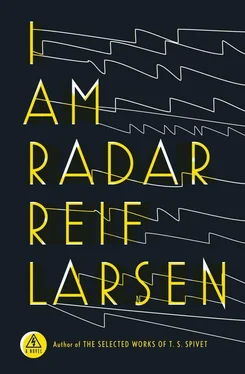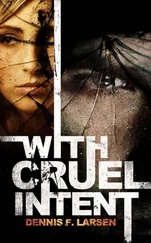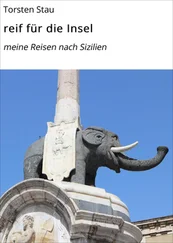“You’re a very good storyteller,” said Horeb. “You should write this down.”
“It’s already written down.” Radar pointed to the book.
“I mean, in your words, like how you said to me,” said Horeb.
“I’ve only ever written a Little Rule Book for Life. ”
“Like a Koran?”
“Not quite.”
“But I’m serious. When I listen to you, I feel your words. You have a gift. When you tell me about this terrible tragedy in Cambodia, it’s like I am there. I am remembering, too.”
“You remember what?”
“When I was four, I saw a man shoot my father in Yaoundé.”
Radar blinked. “Why?” he said.
“My father owned a factory. The man was a Marxist. I didn’t know any of this at the time. . I was just a little boy. All I knew was a man came and made my father fall down, and then my father disappeared and never came back. My mother had already gone back to Senegal, so I grew up with my aunt and uncle. And they taught me Islam. I lost my father, but I found my belief.”
“What happened to the man?”
“They beat him to death. They beat him. I was too young to tell them to stop.”
Radar looked up and saw Lars standing next to them. He was holding a yellow tracksuit in his hands.
“It’s for you. It’s our uniform,” said Lars. His eyes were wet.
“Thank you,” said Horeb, bowing. “I will wear it well. Live long and prosper.”
• • •
RADAR WAS IN THE middle of telling Horeb about Kermin, the great puppet designer who had resurrected Kirkenesferda from the ashes by organizing the fourth bevegelse, in Sarajevo’s library, during the middle of the Balkan war.
“And Kermin is my father,” he declared proudly.
“And so why is your father not here?” asked Horeb.
Radar opened his mouth and then shut it. He was about to try and explain the blackout in New Jersey when the truck slowed and came to a stop.
The door to the container was unlatched. Professor Funes appeared beneath his parasol.
“A stop,” he said. “For petrol. And the calls of nature.”
Radar looked at his watch. They had been driving for almost three hours.
They hopped down from the container, some more nimbly than others. Radar blinked in the bright sunlight. The truck was parked at a dusty filling station that housed only a single pump. There were four other trucks ahead of them in line, each stacked high with goods — bananas, furniture, PVC piping. The station was in a town that seemed to consist mostly of tin-roofed houses with a couple of mud streets running between them. A large church could be seen rising above the rest of the buildings. Somewhere, a radio was playing rumba.
Horeb, now wearing the yellow tracksuit, washed his hands and face using a bottle of water and then placed his mat on the ground by a grove of spindly trees. He began to pray.
When Radar came out of the restroom, Horeb was still praying. Otik and Lars were already clambering back inside Moby-Dikt, but it would still be some time before they would get fuel, since the line of trucks at the pump had not gotten any shorter.
He did not want to go back inside just yet, so, feeling surprisingly adventurous, Radar ambled down a side street. It was remarkable how even a day in a new place could acclimatize you. Yesterday morning, he would have done no such thing. Yesterday he was a coward who had never been to Africa, who knew only of New Jersey and recumbent bicycles and radio stations. But now? He was an explorer. A man in the world. Dusty streets were the new normal.
He came across a group of young boys who were kicking around an old soccer ball wrapped with tape. As soon as they saw him, they stopped and stared.
“Hello,” he called out timidly, suddenly aware of himself as foreign.
The kids continued to stare. One boy scratched at his balls.
“Bonjour,” Radar tried. “I am Radar.”
“They don’t see many mundeles around here,” said Horeb, materializing behind him.
“Mundeles?”
“White people,” said Horeb, laughing. “Would you like to play?”
“Play?” Before Radar could say more, Horeb dived among the children and expertly dribbled the ball around the kids with his feet. Soon, the children began yelling and laughing, trying to get it back. But when Horeb kicked the ball to Radar, the kids stopped again and stared.
One of the kids pointed, said something to Horeb.
“They want to know where you come from,” said Horeb.
“New Jersey.”
“New Jersey?”
“It’s next to New York.”
Horeb began to talk to the children.
“What are they saying?”
“Children are always so funny. They want to know why you look the way you do. I’m trying to explain to them, but it’s not easy. Why does anyone look the way they do?”
All at once, everything felt very familiar. He had been here before.
“Tell them I wasn’t always like this,” he said.
“What?”
“Tell them I was born black like them.”
Horeb raised his eyebrows.
“Tell them.” He knew it was impossible, but he had talked to these children before. He had seen these same expressions of wonder. He had stood under this same sun.
Horeb dutifully translated.
“They want to know what happened to change you into a mundele .”
“Tell them. .” He was trying to remember what he said the first time. “Tell them it was a machine. Tell them it was electricity.”
Horeb shook his head. “These are children. They will believe you. Some of them have never seen a mundele before.”
“I’m not lying,” said Radar. “It’s the truth. It was a machine.”
Horeb studied Radar’s face.
“Tell them,” said Radar. He needed the children to understand, just as they had understood the first time. “Tell them I went to Norway, in the north, where there’s snow, and a machine changed me. Tell them it also made me very sick. I got seizures. This leg grew weak. Tell them this is why I can’t play soccer very well.”
Horeb took a step toward him. The sun was hot overhead, and Radar felt his head begin to spin, but he did not look away. The feeling of déjà vu receded. Everything was new again. He could feel the sun, and Horeb was coming closer. In his previous life, this would have been the time when he would have had a seizure and the children could have seen for themselves what the machine had done to him, but now he did not seize. He stayed awake, staring into Horeb’s eyes, and he knew then that he would never seize again. He knew he had been cured. Cured by his father’s electromagnetic pulse.
Horeb brought his head very close to Radar’s until their foreheads were touching.
“Enna lillah wa enna elaihe Rajioun,” he whispered. “Jazaka Allahu Khairan.”
“It’s the truth,” said Radar. “It’s the truth.”
Horeb put his hand against the soft part of Radar’s neck and then turned and began to speak. The children listened and stared.
“They want to know why you changed.”
“Tell them it wasn’t my choice,” said Radar. “But I’m the same person I was before. Tell them I’m like them. Tell them this never changes.”
Horeb nodded. He spoke. He spoke for a while. When he was done speaking, a silence settled over them, until Radar limped over and kicked the ball and the children whooped with delight and easily took it away from him. Horeb swept in and recaptured the ball, and soon it was the two of them in their yellow tracksuits against all of the children. Horeb would keep the ball, pass to Radar, who would lose it, and the children would pass it around before Horeb would win it back again. The simplest of games, but enacted here, it was a pure and untouchable act that superseded all else. Language, color, time, place — none of it mattered when the ball was moving.
Читать дальше












